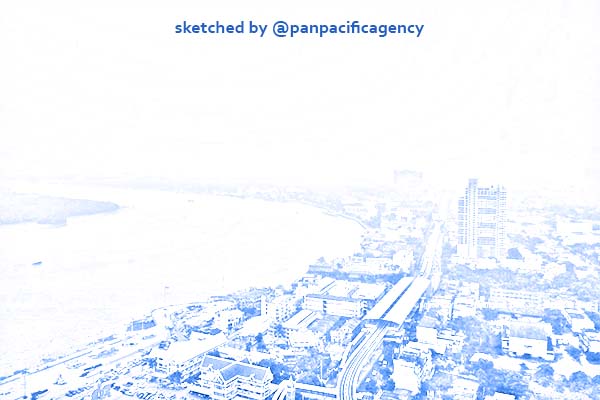Fine dust levels breached the safety threshold in greater Bangkok

Thick smog covers Samut Prakan and Bangkok on Monday morning. (Photo by Somchai Poomlard). Sketched by the Pan Pacific Agency.
BANGKOK, Sep 30, 2019, Bangkok Post. Fine dust levels breached the safety threshold in greater Bangkok on Monday morning, with the worst air in the city’s Bang Kholaem district, reported the Bangkok Post.
Pralong Damrongthai, director-general of the Pollution Control Department, said the levels of particulate matter of 2.5 microns and less in diameter (PM2.5) were unhealthy in Bangkok’s Bang Khen, Bang Kholaem, Bang Khun Thian, Bang Phlad, Bang Rak, Bang Sue, Bangkok Noi, Bung Kum, Chatuchak, Din Daeng, Khlong San, Khlong Toei, Laksi, Pathumwan, Phasi Charoen, Phaya Thai, Samphan Thawong, Sathon, Thon Buri, Wang Thong Lang and Yannawa, districts.
Unsafe levels were also detected in Nonthaburi’s Bang Kruai and Pak Kret districts, Pathum Thani’s Khlong Luang district, Samut Prakan’s Muang and Phra Pradaeng districts, Samut Sakhnon’s Krathum Baen and Muang districts, and Nakhon Pathom’s Muang district.
The levels of fine dust were rising in almost all these areas, up from Sunday’s readings, Mr Pralong said.
He attributed the pollution to stagnant air during a seasonal transition period and lower rainfall.
He warned vulnerable groups of people to stay indoors or wear face masks if they must go out for a long period. He in particular referred to young children, pregnant women, the elderly and those with chronic diseases.
The worst level of PM 2.5 pollution was reported in Bangkok’s Bang Kholaem district, with measured level of 78 microgrammes per cubic metre of air in the past 24 hours. The safe threshold in Thailand is 50mg, which is higher than the recognised safe level in many countries.
Bangkok ranked third for pollution globally among major cities about 9.45am, according to data from monitoring site IQAir AirVisual.
Prime Minster Prayuth Chan-Ocha used tweets to advise people to don masks if they plan to spend time outside, and asked factories and building sites to cooperate by curbing smoke and dust.
Pollution spikes caused by industrial emissions, construction, crop burning and vehicle fumes have rattled Thailand in recent years. The smog was one of the top trending items in the country on Twitter, underlining growing concern as officials struggle to control the problem.
Southeast Asia in the past few weeks suffered from poor air quality caused by Indonesian forest fires, but hot-spots there have dwindled.